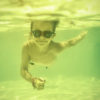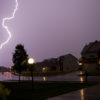Teaching children to swim at an early age creates a safer environment for homes with pools. Focusing on safety in the pool and around the water, in addition to the conventional swimming techniques and strokes is important. Keep your pool clean and chemically treated to ensure safe, bacteria-free water for your children and guests. For parents and grandparents in Florida, Texas, or Arizona, rely on Pool Troopers for your pool services year-round.
If you are teaching kids to swim this summer, keep pool safety in-mind:
Never Swim Alone without a Pool Watcher
Do not ever leave a child alone in or around your swimming pool or spa even briefly. Make sure there is a responsible adult nearby to prevent accidents and potential injuries. If swimming in a lake or ocean, always use the buddy-system and swim in pairs, whether you are a child or an adult.
Look for a Lifeguard
Never swim in the ocean or at the beach unless there is a trained lifeguard on-duty. If there is another adult with CPR and water rescue knowledge, they will provide the supervision needed for being near the water, but when swimming in open water, a lifeguard is the safest precaution to take.
Give your Child Lessons
Make a point of getting swim lessons for your child to help them combat any fears regarding the water, while also creating a safer environment at home around the pool.
Tips for teaching children to swim without fear include:
• Start slow so the child is not frightened and let them acclimate to the water.
• Teach breathing exercises in the tub. Gently blow in a baby’s face to encourage them to hold their breath when swimming.
• The earlier you get your child accustomed to the water, the less fearful they will be of swimming later.
• Never force a child to swim or get in the water.
• Foster a love of swimming by having them look for a prize in the water as an incentive.
These are tips from professionals who work with youngsters every day. Need more help teaching your child to swim? Visit a local community center or group to sign your child up with a trained swim instructor.
Don’t Ignore Drains
Pools and spas have drains that serve an important role in keeping the water clean, but these fixtures can be dangerous. Individuals, particularly smaller kids, can easily become entrapped and suctioned to the drain accidentally. Make sure that your drain is covered and working properly by having your pool periodically serviced and inspected by a pool professional. Keep a close eye on children any time that they are in the water to be safe.
Slow Things Down
Avoid fast moving water when you are teaching your child to swim. It makes sense to start in a pool before moving to open water or any place where there could be a dangerous current. When teaching children about fast-moving water, explain that if they are in a current, swimming parallel to the shore may help them avoid getting pulled-under or fatigued.
Discourage Diving
Discourage children from diving in water of any kind, whether this be a pool or the ocean. You never know the depth of the water, which makes diving a very dangerous thing to do. Furthermore, there could be objects or hazards under the water surface that could cause problems when diving in.
Stay in the Shallow End
Keep kids in the shallow end of the pool as much as possible. How do you do this? Create attractions and incentives, like pool toys, games, and features that will attract their attention and make them want to stay in this relatively safer area of the pool. Parents, be careful. Even one inch of water can be a drowning hazard for a small child. Keep your eyes on your kids at all times.
Secure with a Fence
It is critical to contain your pool or spa with a secure fence that is at least four feet in height around the entire perimeter of your pool deck or spa area. This should be free of any way that a child could circumvent and access the water. Use latching gates and alarm systems to add further safety features to your property. Be wary of any pet doors that could also help a child gain access to your pool.
Sound an Alarm
Speaking of alarms systems, make sure that you equip your pool with safety features, like a pool alarm. This will sound when something, or someone, enters your pool.
Prohibit Pets
Make some firm rules regarding pets near or in the pool. If pets are in the water, this may serve as a temptation and incentive for children to enter the water, which could be potentially dangerous, even fatal. Prohibit and deter pets from swimming and children will be less inclined to follow suit and jump in after their furry friends.
Keep Help Nearby
Place rescue gear, like a life ring or preserver, near the pool in the event of an emergency. A long
shepard’s hook is another rescue aid that belongs near your swimming pool.
Share with Others
Share this information with friends, family, and neighbors. Don’t keep safety instructions regarding your swimming pool a secret. Prepare those that use the pool periodically with the information that they need, i.e. where safety devices are kept, so that they are also ready and able to avert a crisis.
Check your Pool FIRST
If there is ever a time that you are looking for or trying to find a child, always head to the swimming pool or spa first. Run don’t walk as seconds count. The time wasted looking in other areas could provide them with the window of opportunity to get in the water and become injured or drown. Look outside at the pool first, and then check indoor hiding places.
Stay Inside
Teach kids to stay safe during storms, too. Don’t encourage them to swim outside during a storm. Teach them to get out of the water and seek shelter. Also, if you are at a beach or outdoor venue, get inside during a storm before lightning can potentially strike.
Take a Class
In addition to swim classes, encourage the family to learn CPR. This is often taught locally at community centers and health clinics widely. Find a class near you and become certified to make your pool and whole home a lot safer.
According to governmental studies, there are around ten accidental drowning deaths each day. In fact, it is estimated that drowning is the second leading cause of accidental death for children under the age of 14. Small children and babies can drown in under 20 seconds, which further reinforces why you should never let them near the water unsupervised or take your eyes off a child for even a minute. Don’t let someone you love become a statistic. Encourage and model safe behavior near and around water. Teach your kids to swim and they will be safer this summer, next season, and the rest of their lives.
Tired of doing all the pool maintenance work yourself? Hire the professionals at Pool Troopers. Pool Troopers is your full-service pool maintenance company for residential pool owners who have experienced hit and miss service with other pool service companies. Pool Troopers provides chemical, cleaning, and repair pool services. Call for free price quotes and service estimates today.



